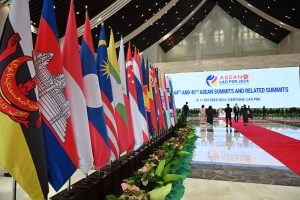Criticisms of ASEAN from within are rare, despite well-publicized splits over issues like Chinese encroachment across the South China Sea, the conflict in Myanmar, and organized crime syndicates which have transformed human trafficking into a multi-billion-dollar slave industry.
The bigger the headache the more leaders among the 10-nation bloc have ritualized tight-lips in public and have always refrained from criticizing the organization or the internal affairs of their neighbors.
But those issues, and where to align between the United States and China, have also paralyzed ASEAN as the central policy body for Southeast Asia and as the go-to bloc for the rest of the world in regard to multilateral interests and regional problems like Myanmar.
Two weeks ago, Cambodian Senior Minister Sok Siphana broke ranks and called for a “reboot” of the organization, and with the re-election of Donald Trump as U.S. president this week, the need to recalibrate with a genuine sense of strategic purpose has never been greater.
Sok Siphana took the soft approach while addressing diplomats and academics at the ISEAS-Yusof Ishak Institute in Singapore, arguing that reform was not about more infrastructure or free trade agreements but more about “thinking outside the box.”
He cited the bloody civil war in Myanmar while others at the seminar added the South China Sea, human trafficking, and scam compounds into a mix that Choi Shing Kwok, the chief executive officer of the ISEAS-Yusof Ishak Institute, said marked an end to the “Goldilocks period.”
That era provided ASEAN with more than half a century of peace and prosperity which lasted five decades and is now being stress-tested by Cambodia, Laos, and the junta in Myanmar, whose leaders have enjoyed a flurry of political exchanges with Beijing as Americans prepared to vote.
Sok Siphana stopped short of saying ASEAN had failed as a centrist regional group while holding an exalted status in negotiations with the West but he made it clear the bloc has fallen short.
“So amid this period of great transformation, the question is to what extent ASEAN is able to defend a stable, multipolar world order in the Indo-Pacific region without isolating China. And to avoid, as during the Cold War, once again becoming another theater of conflict,” he said.
ASEAN – founded in 1967 as a bulwark against communism – has long been split between maritime and mainland nations, along ethnic and religious lines, and by the types of government its people enjoy and endure.
The Biden administration paid heed to those nuances but its patience was worn thin by ASEAN’s inability to fix anything amid Chinese dabbling through its proxy network.
Slogans like the “ASEAN Way” are now little more than platitudes that ring like a dull thud and hold about as much credibility as the Five-Point Consensus that ASEAN envisaged as a means of ending the conflict in Myanmar.
Uncle Joe’s steady ship of state has sailed and Trump’s victory signals a return to the harsh realities of the East-West axis which emerged in earnest when he declared a trade war against China in 2018.
Under that mantra, the Philippines and its reinvigorated ties with Washington are best placed alongside Thailand, which has made something of a return to democracy. Vietnam, Indonesia, and Singapore are strong enough to maintain their own race.
Brunei and Malaysia are increasingly reliant on Chinese investment and, alongside Indonesia, their Islamic cultures will struggle for attention under a Trump administration.
However, military-ruled Myanmar and bankrupt Laos are Chinese dependents, while Cambodia has never shied from promoting China’s agenda among its ASEAN peers.
Trump’s inability to form a coherent foreign policy was a hallmark of his previous administration but his view of China as chief rival and his much-touted desire for revenge will put Beijing firmly on center stage where its tiny allies within ASEAN will be exposed and vulnerable.
At the very least they risk being swept up and marginalized which is why Sok Siphana’s call for an ASEAN reboot is not beyond its time.

































